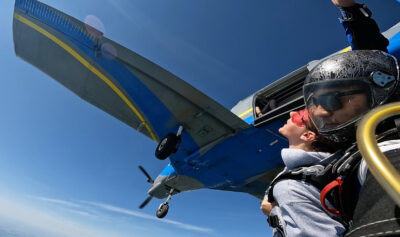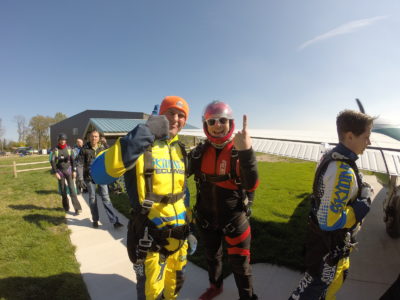Does Skydiving Hurt Your Ears?
Skydiving is an adventure like no other, offering an adrenaline rush that’s hard to match. But as thrilling as it is, there’s always a question about safety and overall health. Skydiving ear pain is a common concern for first-timers and especially seasoned skydivers. So, let’s dive in and discover the truth behind skydiving ear pain and how to prevent it.
Can Skydiving Hurt Your Ears?
Yes, skydiving – and especially skydiving without ear protection – has the potential to cause temporary and even permanent damage to your ears in some cases. Temporary hearing loss can occur from short-term exposure to exceptionally loud noises such as music concerts (120 dB) or a gunshot (140 dB). Being exposed to this level of noise for over 30 minutes and in some cases, far less time can become dangerous. Let’s see how many skydiving measures up compared to other sounds that we are used to in terms of decibels!
How Can Skydiving Hurt Your Ears?
 If we look at the decibel chart, we can see that sounds that reach over about 90 dB start to damage hearing by bending the hair cells within the inner ear, making them dysfunctional temporarily.
If we look at the decibel chart, we can see that sounds that reach over about 90 dB start to damage hearing by bending the hair cells within the inner ear, making them dysfunctional temporarily.
Hair cells in the inner ear are responsible for transmitting vibration energy into signals that trigger the auditory nerve to the brain – where they are recognized as sounds. The hair cells have the ability to straighten back out and recover after a rest period. Permanent hearing loss is the result of long-term or repetitive exposure to loud noises, destroying the hair cells.
A skydiver can experience noises ranging from 62 dB to 115 dB depending on aircraft type, freefall speeds, and ear protection.
Noise Level & Ear Pressure in the Plane
The Federal Aviation Administration (FAA) sets guidelines for noise produced by general aviation aircraft; noise levels vary based on engine type, soundproofing, and physical location within the aircraft. Interior noise levels for most general aviation planes vary from 80 dB to 110 dB.
On a Cessna 172, a noise level of 101.3 dB was calculated during the run-up with the windows open. The average decibels reached over the entire flight was 86.26 dB. The Caravan and King Air skydiving planes proved to be much quieter at just 62 to 76 dB, whereas the Twin Otter aircraft measured at 96 to 103 dB. This level of noise will begin to cause damage to the ears after about 15 minutes of exposure – the typical time for a ride up to altitude.
On a commercial flight, there is a noticeable amount of pressure experienced during ascent and descent that can cause pressure if your ears, typically explained as your ears “popping” – the same is true when traveling up and down mountains. However, skydiving aircraft do not pressurize at certain altitudes like commercial airplanes do. You may notice a bit of “stuffiness” as the airplane slowly climbs in altitude – which is usually pretty painless.
Noise Level & Ear Pressure in Freefall
While there has not been enough research on this topic, we can compare the wind sound levels experienced in motorcyclists’ helmets traveling at 100 mph (112 dB) to the sound levels that might be experienced on a 120 mph skydive. In one study cited by the United States Parachute Association, the majority of skydives performed without wearing a helmet exceeded 115 dB. A skydiver would begin to suffer hearing damage if exposed to this noise level for two to five minutes. Luckily, freefall typically lasts 45 to 60 seconds!
In freefall, you experience a change in altitude much more quickly than you do on the ride up in an airplane. Due to the thinner air up at altitude, the exterior pressure is less than what is in your ear – making the ear want to reach equilibrium by pushing the pressure out. However, as you descend, the air pressure increases, causing the pressure inside your ear to be lower than the pressure outside, which gives your ears a clogged feeling.
Skydiving With a Cold
Now that we understand how pressure works within the ears, we can see how dangerous it is to skydive with already clogged ears. When you have a cold or congested sinuses, the eustachian tube can be blocked up. If the tube is blocked, there is no way for your ear to relieve the pressure build-up and changes that come with skydiving. In extreme cases, skydiving with a cold can result in a burst eardrum. Ouch! No one wants a painful, boogery mess on what’s supposed to be one of the best days of your life – and nobody wants to experience a burst eardrum skydiving or doing anything else!
Do Your Ears Pop When Skydiving?
Whether you actually notice it or not, yes: your ears do pop when skydiving. This only means that your ears are working hard to equalize to the changing external pressures you’re experiencing on your skydive. When your ears pop, it can cause dizziness, ear pain, hearing loss, stuffy sensations in the ears, and nosebleeds.
How to Unblock Ears After Skydiving

If your ears do start feeling the pressure – whether on the airplane to altitude or under canopy on the way back down – you can help move things along by equalizing your ears with a Valsalva maneuver. How to equalize your ears:
- Yawn
- Swallow
- Plug your nose and gently exhale while keeping your mouth shut. (Try it now!)
Do You Wear Earplugs When Skydiving?
If you’re a first-time tandem jumper, skydiving noise may not be a concern. However, if you’re an avid skydiver, those dB numbers might be a worry. How do you stop your ears from hurting when skydiving? Earplugs are not typically worn by tandem skydivers due to the minimal amount of exposure, however, some skydivers opt to wear earplugs especially during the airplane ride and freefall. (If you’re a first-timer concerned about wearing ear protection please talk to your instructor beforehand).
A skydiving helmet can provide about 15 to 20 dB of protection depending on the type of material and fit. Here’s a tip: the denser the material and tighter the fit, the better the protection. Wearing earplugs or active noise-canceling headphones can reduce the sound intensity by an additional 15 to 20 dB on top of the 15 to 20 dB of protection that a helmet provides – that’s 30 to 40 dB of protection if you wear both earplugs AND a helmet. Bottom line, if you wear hearing protection of either kind, you are unlikely to experience hearing damage if you skydive 10 times or fewer within eight hours.
With the right protection, preparedness, and knowing when not to jump – skydiving can be a pain-free experience for your precious ears. Have more questions? Contact one of our helpful team members at Skydive Tecumseh. Ready to get your knees in the breeze? Book your jump today! Blue skies.
The post Does Skydiving Hurt Your Ears? appeared first on Skydive Tecumseh.

